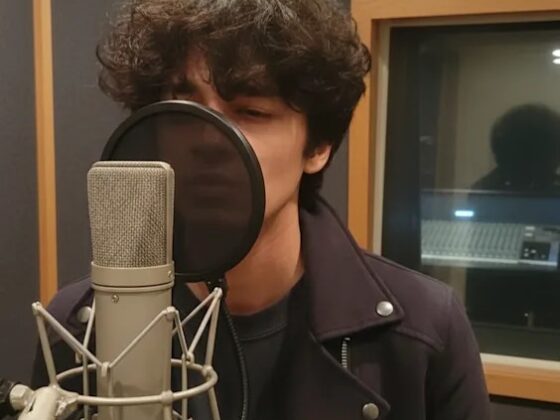By: Shira Rosenthal
Music Writer, Jazz Enthusiast
So let’s say you’re at Russ & Daughters Café, high as a kite off some slightly-too-dry Brooklyn indica, biting into a kosher-style chicken sandwich that’s falling apart with indifference, when a guy next to you drops the phrase “hyperdimensional anchor lines” in a similar tone someone else might use to order a seltzer. You think he’s just another East Village jazz weirdo until he casually mentions working with Steve Gadd, Lonnie Park, and oh—also helping score a peace-themed mega-album with Stewart Copeland and a Japanese shamisen.

That guy? That’s Kobi Arad.
Except calling him a guy barely covers it. Arad is more like a sonic madman who was born with a Rhodes keyboard attached. He’s a composer, yes—yet also a channeler, a codebreaker of sacred geometry through sound, and someone who seems constitutionally only able to make music that defies gravity’s rules. If Ornette Coleman delved into Zohar, smoked hash in Jerusalem, then audited spectral analysis lectures at Juilliard—you’d get close.
His new album Warping is not just a jazz record; it’s a multidimensional compression algorithm disguised as a suite. Built around a compositional framework he coined himself—Anchor Lines—Arad takes melodic and harmonic seeds and transforms them through classical strategies like retrograde, augmentation, imitation, but with the intent of revealing their deeper vibrational archetypes. It’s like watching the Torah unfold itself in audio cables. The album—already running for Grammy consideration—features the track Weave, which earned a Hollywood Independent Music Awards nomination. It’s not surprising. The music sounds like divine recursion dressed up in post-bop sneakers.
But Warping is only the beginning of the current vortex. Arad’s other major release, DNA: Codes Transforming Reality, is where he essentially turns Hebrew letter combinations and Divine Names into pitch material—yes, literal transpositions of sacred text into sonic DNA—and then unfolds those through Anchor Lines into fully realized compositions. It’s both deeply mystical and rigorously musical, a rare combination in a world where the word “spiritual” too often means “vaguely tuned synth pads.” Here, the music channels. Pete Swanson holds down the bass, Ray McNaught drums like he’s deciphering star maps, and the whole thing hums with intent—not ego.
And then there’s Gandhi, the grand production project led by three-time Grammy winners Ricky Kej and Lonnie Park. Arad, brought in as executive producer and sound advisor, helped steer this globally collaborative behemoth toward something tonally unified and sonically clean—no small feat when your lineup includes Police drummer Stewart Copeland, cello powerhouse Tina Guo, and Japanese Grammy-winner Masa Takumi layering in exotic instrumentation. The result is sonic diplomacy at a planetary scale.
But if you think he’s only building celestial temples, hold on: Arad has also been co-producing a genre-defying, Americana-tinged surprise album with Lonnie Park featuring none other than Michael Sembello—yes, the Maniac guy who also wrote with Stevie Wonder and somehow ended up in this metaphysical rodeo. The flagship track Tell Your Story blends Sembello’s melodic gravitas with Arad’s deeply textured Rhodes work, Ron Korb’s shimmering flute, EJ Edward Ouellette’s violin, and Park’s background vocals, all arranged with the kind of ironic sweetness that makes you wonder if American roots music just got secretly blessed by a rabbi in outer space.
Well, the sacred gets personal. Arad’s Ragas Makams Jazz—a fusion of Indian ragas, Middle Eastern maqams, and jazz improvisation—was just nominated for the Intercontinental Music Awards. Featuring Charlie Sabach on oud and Ofer Peled on exotic flutes, this album speaks the language of diasporic soul, the sort of record that reminds you why “world music” used to mean something before the playlists diluted it.
What Kobi Arad offers isn’t easy to brand. It’s not background music. It doesn’t wait politely for your attention. It asks questions. Big ones. Like:
Could sonic frequencies transform?
Could ancient names become melodic segments?
Could jazz become a vessel for decoding the architecture of reality?
There’s something maddeningly sincere about the whole thing—like he’s trying to outwit entropy with augmented scales. But beneath the ambition, there’s clarity. Arad doesn’t compose to impress. He composes to channel. And maybe that’s why so many artists—Grammy winners, fusion legends, postmodern mystics—keep turning up in his orbit.
Because when Kobi Arad speaks through sound, you don’t just listen. You tune in.








